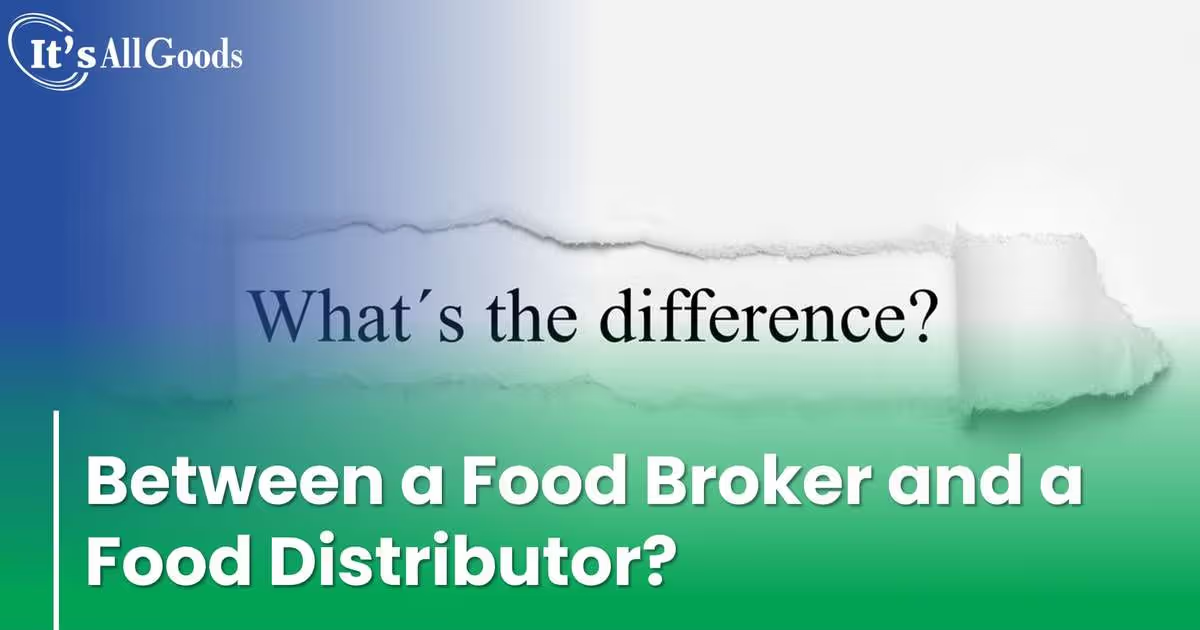

rocery stores carry 40,000 more items than they did 30 years ago. To keep up with demand, many of them rely on food brokers and distributors to stock their shelves.
Seeing that a food broker and a food distributor each have access to the same products, it’s easy to wonder what the difference is between them. In this post, we’ll look at each role in more detail. Keep reading to learn more about these two roles and how they can help your product get into stores.
A food broker sells products on behalf of clients to help them find customers. They market the products to several retailers and don’t have any interest in taking ownership of your beloved goods.
A broker is a middleman between two or more parties, while a distributor is a company that buys goods from a manufacturer and sells them to retailers. In practice, they are often used interchangeably, but there are some key differences between what they do and how they do it.
Food brokers are independent sales agents who typically work on commission for manufacturers as product representatives. They serve as a liaison between the manufacturer and the end consumer, or retailer, to sell your inventory.
A food broker is someone who has good relationships with other retailers and manufacturers. As a result of these professional relationships, the broker can help you get into new markets and make your brand known.
Food brokerages work to find customers and get orders through various marketing methods, which can be more cost-effective than advertising on your own. They may also be more successful at getting companies to order your product.
Food distributors, on the other hand, buy your product upfront, mark up the price, and then sell it to retail outlets. In essence, food brokers increase your overall marketing instead of just trading your product.
Unlike distributors, brokers do not own any products; they simply offer to market those goods for your business.
If you were a manufacturer that wanted to sell your products in retail stores but didn’t want to deal with the hassle of building connections with retailers yourself, you could hire a food broker who would handle all aspects of this process for you. This includes finding customers willing to buy your product at retail prices (which are typically higher than wholesale prices) and managing those sales until they’ve sold out.
A food broker is someone who has good relationships with other retailers and manufacturers. As a result of these professional relationships, the broker can help you get into new markets and make your brand known. They also may have connections to raw material suppliers to help you find the best deal on ingredients for your product.
Distributors play a similar role as brokers, except that once they own your products, you lose control over how they are marketed and to whom.
The benefit of using a broker over a distributor is that they only act as an intermediary between buyer and seller. After the sale is made, it gives you the opportunity to maintain client relationships rather than handing them off completely.
A food broker, or sales agent, is paid on a commission basis. They are incentivized to help you sell your product as much as possible because they earn money based on the volume of sales that they make for you.
A food distributor is motivated to promote its brand and products, not yours. This can create a conflict of interest when deciding which products should be advertised to the public. They may also charge you for services that you can provide for yourself, like packing or shipping.
If you’re looking to build a successful food business, it may seem like the best way to get your products in front of consumers is by hiring a sales team. However, if you can find an experienced broker who has connections to retailers and customers alike, they’ll be able to do the job for you at a much lower cost (the average food broker salary is around 40k - 90k per year). The money saved from not paying out commissions to several salespeople will go back into your company—or perhaps give you some time off from work!
A good food broker will have access to manufacturers, distributors, and retailers across various grocery stores and restaurants. If they take on your product line—cookies, for instance—then they will also have access to all the other cookie companies in their network and all of those businesses’ customers. This makes it easier for them to advise you on profitable business moves.
When you have a food broker on your side, they will handle the marketing for you. This means that they’ll work with a team of people who know the exact steps for getting your products into stores and then into homes. They’ll also set up displays and give presentations at trade shows—all of which give you more time to focus on the quality of your products.
If you’re ready to up your sales, a food broker is a good place to start. They can help you get your products into stores and maximize the reach of your brand—all while saving you time and money.
It’s All Goods strives to ensure that the sales process is handled efficiently to give your products the best chance of getting noticed. We’re here to help you make your food brand a household name. But first, we’d like to hear about your products and see how our food service can help.
Contact us today to discuss how we can work together.